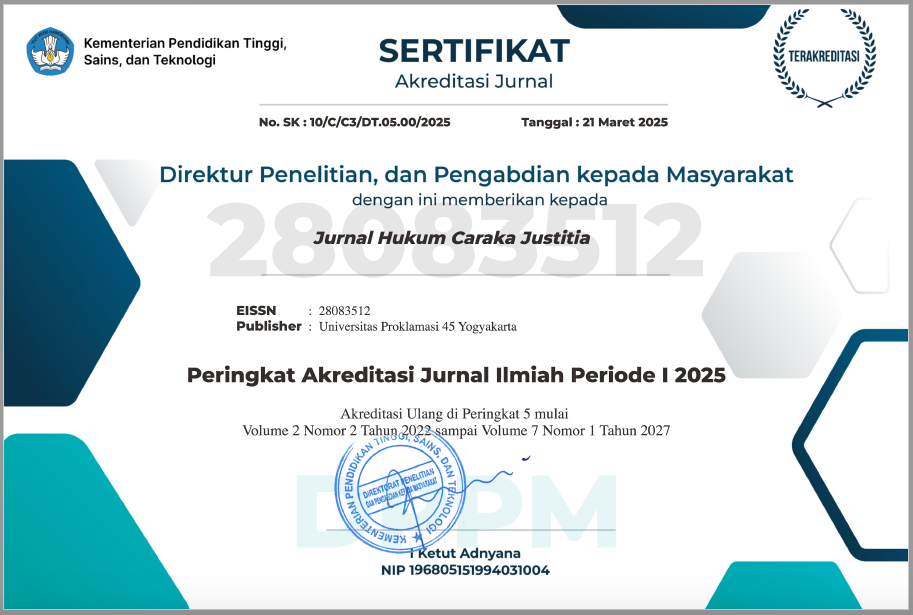Perlindungan Hukum Notaris atas Kewajiban Menerapkan Prinsip Mengenali Pengguna Jasa (PMPJ) dan Laporan Transaksi Keuangan Mencurigakan (LTKM)
DOI:
https://doi.org/10.30588/jhcj.v4i2.1973Keywords:
Notary, Customer Due Diligence, Suspicious Financial Transaction ReportsAbstract
This research analyzes the legal protection of notaries regarding the obligation to apply the principle of recognizing service users and reporting suspicious financial transactions. This research study focuses on whether the obligation to maintain client confidentiality is absolute when faced with a notary's obligation to implement PMPJ and LTKM. Second, what is the legal protection for notaries who implement PMPJ and LTKM obligations? This research is normative, the approach used is statutory and conceptual, and the legal materials used are primary, secondary, and tertiary legal materials collected using library research.
The research results show that first, the obligation to maintain client confidentiality is absolute as per the notary's oath of office and UUJN provisions. The obligations of PMPJ and LTKM are the obligations of notaries who act based on contractual relationships with service users, selling and purchasing property, managing financial services and managing company accounts, and establishing, purchasing, and selling legal entities which are not the duties of a notary's position. Second, legal protection for notaries who carry out PMPJ and LTKM obligations receive legal protection provided directly by the state. This form of protection is provided by the state to provide a sense of security for the reporter or witness from possible threats that endanger their person, life, and/or property, including their family. Notaries as reporters and/or witnesses also cannot be prosecuted either criminally or civilly
References
Artikel Jurnal
Lawa, Ricky Wie. “Perlindungan Hukum Terhadap Notaris Yang Menjalankan Prinsip Mengenali Pengguna Jasa”. Jurnal Proyuris 3, no. 1 (April 2021): 262-272.
Prayitno, Indra. “Telaah Terhadap Pergeseran Kewenangan Notaris Setelah Terbitnya Peraturan Menteri Hukum Dan HAM Republik Indonesia Nomor 9 Tahun 2017 Tentang Penerapan Prinsip Mengenali Pengguna Jasa Bagi Notaris”. Acta Diurnal 1, no. 1 (Desember 2017): 116-121. https://jurnal.fh.unpad.ac.id/index.php/acta/article/view/162/119.
Buku
Haris, Freddy. Notaris Indonesia. Jakarta: PT Lintas Djaja Cetak, 2017.
Lubis, Suhrawardi K. Etika Profesi Hukum, Jakarta: Sinar Grafika, 2017.
Nurwulan, Pandam, Penerapan Prinsip Mengenali Pengguna Jasa dan Laporan Transaksi Keuangan Mencurigakan Oleh Notaris. Yogyakarta: Buku Litera, 2023.
Soeprapto, Maria Farida Indrati. Ilmu Perundang-Undangan, Dasar-Dasar dan Pembentukannya. Yogyakarta: Kanisius, 2006.
Tesis
Muliani, Nurananda Budi. “Tanggung Jawab Notaris Sebagai Pelapor Transaksi Keuangan Mencurigakan Dalam Aplikasi Gathering Reports & Information Processing System (Grips)”. Tesis Fakultas Hukum Universitas Indonesia, 2019.
Tan, Hadiawaan. “Perlindungan Hukum Bagi Notaris Selaku Pihak Pelapor Sehubungan Dengan Prinsip Mengenali Pengguna Jasa Notaris”. Tesis Kenotariatan Universitas Sumatera Utara, 2019.
Internet
PPATK. “Modul E-Learning 2 Prinsip Mengenali Pengguna Jasa dan Pelaporan bagi Pihak Pelapor dan Pihak Lainnya (Bagian 2: Pengenalan Prinsip Mengenali Pengguna Jasa)”. http://elearning/ppatk.go.id (diakses 1 Oktober 2024).
Rozali, Rais. “Asas-Asas dan Teori Pembentukan Perundang-Undangan”. https://zalirais.wordpress.com/2013/09/12/asas-asas-dan-teori-pembentukan-perundang-undangan/ (diakses 1 Oktober 2024).
Downloads
Published
How to Cite
Issue
Section
License
Copyright (c) 2024 Reynaldo Saputra

This work is licensed under a Creative Commons Attribution 4.0 International License.
Authors who publish with JHCJ agree to the following terms:
Authors retain copyright and grant the JHCJ right of first publication with the work simultaneously licensed under a Creative Commons Attribution 4.0 International License that allows others to share (copy and redistribute the material in any medium or format) and adapt (remix, transform, and build upon the material) the work for any purpose, even commercially with an acknowledgment of the work's authorship and initial publication in JHCJ.
Authors are able to enter into separate, additional contractual arrangements for the non-exclusive distribution of the journal's published version of the work (e.g., post it to an institutional repository or publish it in a book), with an acknowledgment of its initial publication in JHCJ. Authors are permitted and encouraged to post their work online (e.g., in institutional repositories or on their website) prior to and during the submission process, as it can lead to productive exchanges, as well as earlier and greater citation of published work (See The Effect of Open Access).














